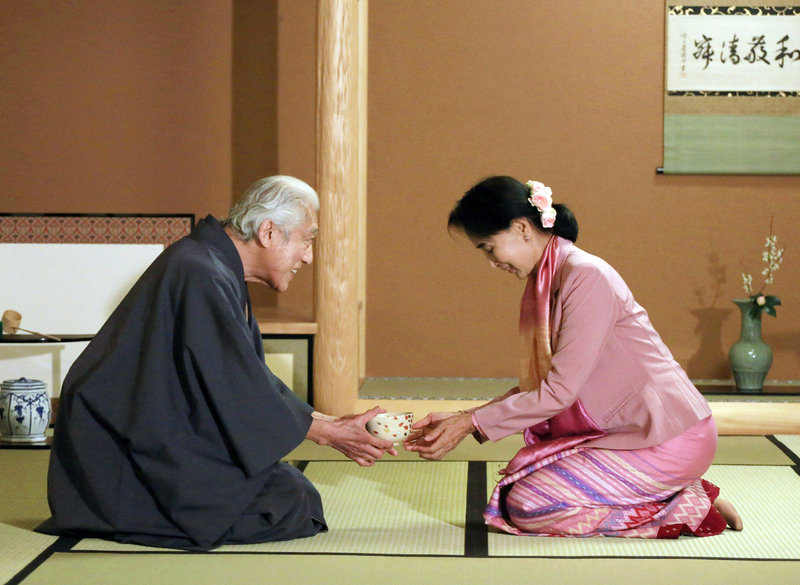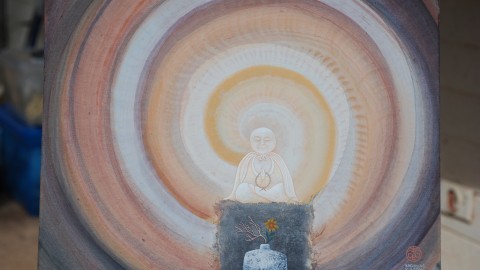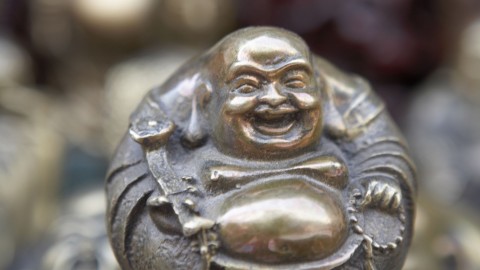Hogen, a Chinese Zen teacher, lived alone in a small temple in the country. One day four traveling monks appeared and asked if they might make a fire in his yard to warm themselves. While they were building the fire, Hogen heard them arguing about subjectivity and objectivity.
He joined them and said: “There is a big stone. Do you consider it to be inside or outside your mind?”
One of the monks replied: “From the Buddhist viewpoint everything is an objectification of mind, so I would say that the stone is inside my mind.”
“Your head must feel very heavy,” observed Hogen, “if you are carrying around a stone like that in your mind.”
Transcend Knowledge
Small story with deep insight. After reading the story who found that we are also in the same conditions as the four monks. Look in our own life, how much eager we are to carry the burden of knowledge all the time. Not only that but we are running after more knowledge so that we can brag regarding our knowledge. But never thought that how to create small experience or practice one word.
All our stress and burdens are because we are after more knowledge instead of creating experience of anything. This is the reason we are always in a hurry. We are in a hurry to answer, we are in a hurry to take action without creating any experience of anything. If we create any experience then we become responsible for our actions. But if we follow and collect the knowledge then the responsibility is on others.
As we are after the knowledge and not creating any experience from the knowledge we always think how to receive more. We don’t want to share anything. We want to be possessive regarding everything. We want to possess, in the process we create misery for us. We become bagger. As we always focus on what we want. We may have everything of the worldly requirements but we cannot grow out of that. We are not able to see what resources are available and opportunities are available for us to grow in consciousness.
God give us always opportunity to grow, to become emperor but as we are stuck in the knowledge we always think in terms of profit and loss in terms of objective world. In the process we miss the opportunity to take any challenge. We are always afraid to see what we can deliver. Most important thing we miss that our expression of love in our action. As our focus is always on receiving and not giving so we are not able to express our love through our action. We verbalizing love but the expression of love in our action is not there. As we are after the knowledge we automatically become possessive. When we are possessive, so our love cannot be expressed through our actions. We don’t find freedom in our relationship. We all the suffocating in relationship. We are with each other because of our need and not because of our love. Once our need from that person is not fulfilled we immediately keep distance from that relationship. To express our love we need to transcend the knowledge to knowing. By doing this you will find freedom from all your conditioning. Once you will have freedom from your conditioning immediately you will see that your abundance consciousness start growing and you immediately become emperor.
Learning from story Big Stone: Transcend Knowledge
Experience Learning
All knowledge that’s given to us is a training wheel to Self-knowing.
When we stay stuck at acquiring and accumulating facts, figures, and funds of knowledge, we can become scholars; but when we use the facts and figures to enlarge the scope of our vision, we leap into the vast ocean of Self, into kNOWing the spacetime which we are.
In knowledge we navigate this wonderful world. In Knowing world and self are one.
What is Self-Awareness?
Simply put, self-awareness is an awareness of the self, with the self-being what makes one’s identity unique. These unique components include thoughts, experiences, and abilities.
The psychological study of self-awareness can be first traced back to 1972. Psychologists Shelley Duval and Robert Wicklund’s developed the theory of self-awareness.
They proposed that:
“When we focus our attention on ourselves, we evaluate and compare our current behavior to our internal standards and values. We become self-conscious as objective evaluators of ourselves.”
In essence, they consider self-awareness a major mechanism of self-control.
Psychologist Daniel Goleman proposed a popular definition of self-awareness in his best-selling book “Emotional Intelligence,” as “knowing one’s internal states, preference, resources, and intuitions.”
This definition places more emphasis on the ability to monitor our inner world, our thoughts and emotions as they arise.
It is important to recognize that self-awareness is not only about what we notice about ourselves but also how we notice and monitor our inner world.
Have you ever held judgment towards yourself regarding the thoughts or experiences you have? If so, then you are not alone, and there it is time to work towards a non-judgemental reflection of yourself.
This is—of course—easier said than done.
If non-judgmental quality is an essential component of self-awareness, how do we work towards that?
As we notice what’s happening inside us, we can acknowledge and accept them as the inevitable part of being human, rather than giving ourselves a hard time about it.











